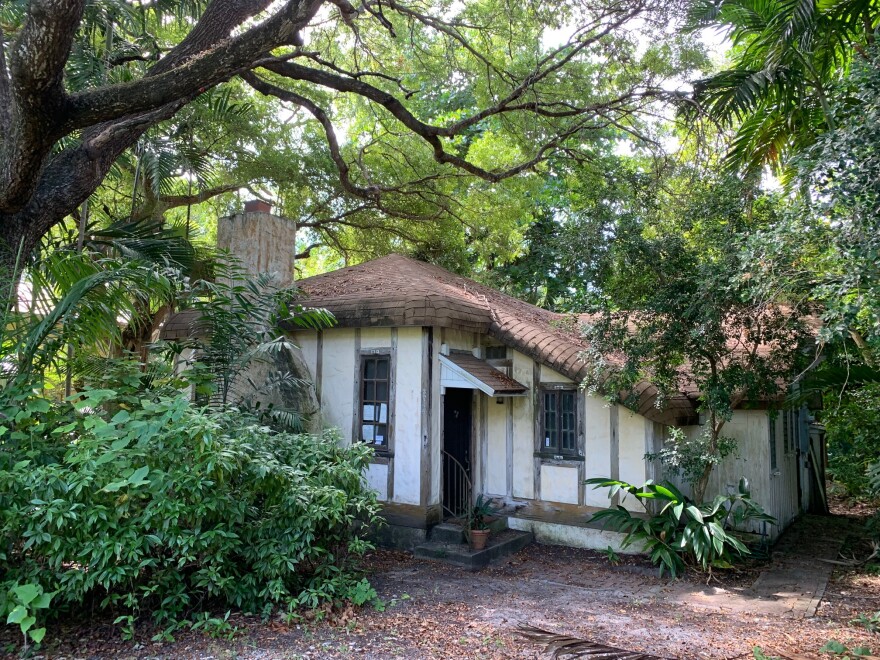Before her death in 1998 at the age of 108, the author and famed environmentalist Marjory Stoneman Douglas told friends she hoped her simple cottage in Coconut Grove would one day become an inspiration to others.
Douglas had spent seven decades in the house tucked into the back of a narrow lot — living a near spartan life by today’s standards — just a short walk from Biscayne Bay.
“The inside is perfectly practical and suits me very well,” she said of the house she described as a workshop, and where she penned her book The Everglades: River of Grass in its cozy living room. “I don't want anything bigger than this.”
Now surrounded by the McMansions of Coconut Grove, the tiny timber-framed cottage is English in charm and almost hobbitish in size, like a piece of Middle Earth dropped in the tropics.
Built between 1924 and 1926 for its sole occupant, the 916 square-foot house has changed little — except for its deteriorating condition — since Douglas hosted press conferences on her front lawn. That’s also where Gov. Lawton Chiles signed a state law promising to clean up the Everglades.
But a quarter century later, plans to convert the house into a museum with a neighboring educational center remain largely undone, caught in a stalemate between wealthy neighbors, loyal friends and the state.

“She knew our plans and wanted them to be carried out,” said Sallye Jude, a friend and preservationist who helped negotiate the deal with the state to purchase the house while Douglas was still living. “She thought they were what really would work for her.”
Now Jude, 96, says those plans may not happen in her lifetime either. “Queen Elizabeth was born just a couple of days from the time I was and I know it's not forever for me,” she said.
The inception of the project
The museum idea started in the early 1990s as Douglas’ health deteriorated and her need for care extended beyond her tight finances. Other environmentalists and preservationists were eager to find a way to help, Jude said. And as a founding member of the Florida Trust for Historic Preservation in 1978, Jude had connections.
After two meetings at her house that led to the creation of the Land Trust of Dade County, Jude said the group came up with the idea of having the state buy the house and allow Douglas to continue living in it until she died. Jude said she made the trip to Tallahassee to convince lawmakers.
“I just told them the story of what her needs were and how this could work out wisely for them,” she said.
She was a hero. She should be recognized as a hero and our kids should learn about that.Jay Flynn, neighbor and campaigner
The trust then began raising money to help care for the house and plan for the museum. They persuaded the city of Miami to declare it a historic structure; in 2015 it was also added to the National Register of Historic Places. They held fundraisers on Douglas’ 100th and 105th birthday, collecting $250,000. Some went to repair the house after Hurricane Andrew and $150,000 was used to purchase the neighboring property that belonged to her college roommate.
The trust envisioned uniting the two properties, with Douglas’ house serving as a museum, kept largely as she lived in it to showcase her legacy. “Marjory really felt that a person had a lot of power individually,” Jude said. “They can live a simple life and still make a difference. And that's what she did.”
They wanted the neighboring property to become an educational or visitor center with parking.
In 2002, the trust presented the plan to the state, said Mary-Therese Delate, a trust board member who had also served as treasurer for Friends of the Everglades, the nonprofit started by Douglas.
“But then, the neighbors were very upset,” she said. “They didn't want school buses pulling up to the front door in their neighborhood. It's a very narrow street.”

In his biography about Douglas, University of Florida historian Jack E. Davis said one neighbor, an attorney, wrote state officials repeatedly, warning that litigation could ensue. Neighbors also began complaining about the condition of the house, Davis wrote.
The state takes back management
So in 2007, the state took back management. In the years that followed, Jude said board members would talk to state officials about once a year to check on plans, but nothing ever came of the talks.
Before the state took over, the trust had also taken all of Douglas’ belongings — including the big desk where she wrote River of Grass and her books — and put them in storage for safekeeping, Jude said. That also became a point of contention.
“Many of us on the board have had personal experience with Marjory, and that's why we want to protect this house, but yet have it open to the public on a limited basis, working with the neighbors, working with the state,” Delate said. “It needs to be viewed and people need to appreciate who Marjory Stoneman Douglas was.”
When workers from the nearby Barnacle House State Park began living in the house, Jude says she no longer trusted the park service to properly care for the house.
"They took it on not understanding the significance or anything about the house," she said. "They moved people who worked for the Barnacle in there and put in washers and dryers and stoves and refrigerators. Things that were not part of Marjory's life."
Douglas only ever used a hot plate and never had a washing machine.

For more than a decade, nothing much happened. Part of the problem was money. The state parks department had been chronically underfunded, and an uptick in hurricanes meant money for repairs was often spent on bigger facilities.
“Every year the park service cannibalizes itself for operations and staff,” said Eric Draper, who was director from 2017 to 2021. “It has more to do, more people to serve, with the same amount of operational funds.”
When he started as director, the service had 1,035 positions. In four years, only four more positions were funded.
Fixing the house had also become more complicated as drainage problems worsened. The property sits downhill, with Douglas’ house at the back of the lot perched on even lower ground that floods. That’s caused problems with the foundation.
Getting past the impasse
To try to get past the impasse, the park service held an open house in 2018 and invited all the sides to hammer out a deal. Neighbors agreed to having the house open by appointment only, and the Trust was willing to sell the land, but wanted $600,000. That was too high for the park service, but below market value. Things hit another stalemate.
Then in August, neighbor Jay Flynn had had enough. He took pictures of the disrepair, the rotten wood around the house, the back patio littered with nuts from a tropical almond tree, even two cases of beer sitting on a kitchen counter and began reaching out to neighbors and Friends of the Everglades.

“It just seems a shame that somebody who was so known for her determination and effectiveness to get things done - good things done - has now had her house fall victim to this neglect,” Flynn said after pointing out a hole in a roof over a closet for the hot water heater. “It's just so ironic that she is who she was. And now we've failed miserably in her memory.”
State officials declined to answer specific questions and instead replied with a statement saying because of its location, “in a densely populated residential area, it presents unique challenges for land and resource managers.”
A spokeswoman wrote that the service was in the midst of developing a management plan that made it part of the nearby Barnacle House State Park. That would require an amendment to the plan, now being drafted, which would be open for public comment.
The state did not respond to requests for drafts of the plan.
But it seems Flynn's noise had an effect. Within a couple of weeks, state officials posted a bid request for restoration work. The bid office provided specs for the scope of the work, including a fence between the two properties, pavers, a brick walkway and gravel to deal with flooding.
Trust board members worry the plan alters the property too much, especially the tropical landscape around it.
“The state really had no interest in keeping anything but the largest specimen trees on the property,” said Bruce Brockhouse, president of the Trust and a landscape architect. “They didn’t really understand how she lived.”
And not including the neighboring property as an adjunct education center limits what kind of programs can be held, he said.
“What we really want is…for people to be able to learn and study,” he said. “The only reason plan didn’t go through is because the neighbors complained about the traffic. They have a treasure there, but they don’t see that the treasure is just her.”
He sympathizes with their objections over the traffic.
“I don’t disagree,” he said “But I live in a quiet neighborhood that now has a school nearby. People co-exist in a neighborhood for the benefit of the public and not just the neighbors.”
And while the park service balked at the asking price for the land before, last year the service got a budget bonanza, with $233 million set aside for capital improvements. That could help move things along.
For Flynn, who lives a block away, restoring the house and getting it open to the public is more than overdue.
“I would like to see the caretakers of this house adopt the same determination in getting this repaired and fixed up and open to the public as Marjory Stoneman Douglas did in her life,” he said. “She was a hero. She should be recognized as a hero and our kids should learn about that. Who are heroes these days, you know? You pick up the newspaper, turn on the news and tell me, who's a hero?”




